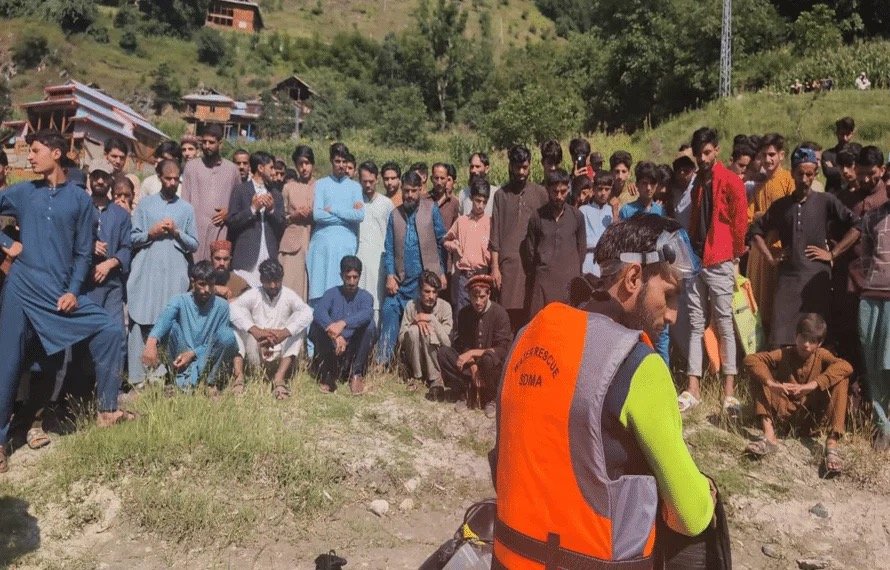By Zulfiqar Ali, Shahzeb Afzal, Shujaat Mir ( Kahmir Investigation Team)
MUZAFFARABAD (Kashmir Digital): Azad Jammu & Kashmir (AJK) has been granted access to Green Climate Fund (GCF) financing for the first time since its establishment in 2010 under the Cancún Agreements.
Earlier in 2019, Azad Kashmir was denied funding due to its status as a disputed territory.
The GCF, a dedicated financing mechanism for developing countries within the global climate architecture, serves as the Financial Mechanism for both the United Nations Framework Convention on Climate Change (UNFCCC) and the Paris Agreement.
Read More: Corruption of seven Kashmiri companies worth billions of rupees exposed
In a meeting presided over by the Secretary of the Ministry of Climate Change and Environmental Coordination (MoCC&EC) on February 11, 2025, in Islamabad, AJK was formally informed of its inclusion in GCF-funded projects worth 10 million dollars for this year.
This marks the first time the region has been part of such funding.
A landmark shift
AJK’s access to GCF funds is a landmark development, marking the beginning of efforts to combat climate change in a region where such action had previously been entirely absent due to a lack of initiative by the Azad Kashmir government.
Since neither the government of Azad Kashmir nor any of its departments is an accredited entity with the GCF, it will need to submit proposals through an accredited organization or institution to access funding. According to officials, the proposal is currently under process.
The irony lies in the fact that, despite the creation of the GCF nearly 14 years ago, successive governments of Azad Kashmir have made no serious effort to gain accreditation.
An official privy to the situation told Kashmir Digital that while a few meetings were held, there was no real progress in obtaining accreditation.
AJK financial mismanagement
The lack of seriousness on the part of the Azad Kashmir government is evident from the fact that only Rs 150 million have been allocated for the environment in the current fiscal year, with Rs 18 million spent in the fiscal year 2024-2025, and this money was spent in January this year.
The reason for this is that funds are either not provided at all, delayed, or allocated in very small amounts by the government, or the department cannot spend the money.
AJK’s struggle with International Climate Finance
Historically, AJK has faced significant barriers in accessing international climate finance Documents reveal that in 2019, the GCF denied funding to AJK, citing its disputed status as the primary reason.
According to the documents available with Kashmir Digital, the AJK government had submitted a $37 million proposal for the “development of a climate change-resilient natural resource base to support the livelihood of vulnerable communities in upland watersheds” through the International Union for Conservation of Nature (IUCN) in 2018, an accredited entity with the GCF.
However, the GCF rejected the proposal, citing the disputed status of Azad Kashmir, officials admit.
Similarly, in 2021, documents reveal that the World Bank also refused to provide funding to the region on the same grounds.
The government of Azad Kashmir had submitted the “Ecosystem Restoration in Selected Areas of the State” project to Pakistan’s National Disaster Risk Management Fund (NDRMF), a government-owned, not-for-profit institution responsible for managing investments aimed at reducing climate risks and vulnerabilities.
In December 2021, the NDRMF informed the government of AJK that it would refuse funding for the “Ecosystem Restoration in Selected Protected Areas of the State” project. The proposal, estimated to cost PKR 1.6 billion, had been submitted by AJK’s Forest, Wildlife & Tourism Departments and the Planning and Development Department.
The project sought grant financing under Pakistan’s Ecosystem Restoration Initiative (ESRI), with funding coming from the World Bank.
In its communication to the government of AJK, NDRMF explained that the World Bank, which was providing funds under the ESRI, had specific guidelines prohibiting financing for activities in disputed territories.
Due to these restrictions, NDRMF stated that the project could not proceed and would be removed from the World Bank’s portfolio.
Furthermore, since the funds were being channeled through the World Bank under Pakistan’s Ecosystem Restoration Initiative (ESRI) portfolio to the Government of Pakistan, NDRMF clarified that it could not proceed with the project.
Previously, the NDRMF had issued a financing offer letter for the project on June 9, 2021, which was accepted by the Government of AJK on June 24, 2021. However, due to restrictions imposed by the World Bank, NDRMF had to withdraw its financing offer, ultimately terminating the matter.
Can foreign financing alone help AJK?
The question remains: can foreign financing alone truly address the climate crisis in Azad Kashmir? Experts have noted that while access to Green Climate Fund (GCF) resources is an important step, it is insufficient on its own. The institutional framework to tackle climate change in Azad Kashmir must be significantly strengthened.
According to an expert, “Similar to Pakistan, a dedicated climate change authority should be established at the state level. This authority would create a state-level act, serving as a legal framework to ensure the effective implementation of the National Climate Change Policy in Azad Kashmir.”
The expert added, “Once these measures are in place, it will be possible to control various factors contributing to climate change.”
After establishing the institutional framework, the expert emphasized that climate change should be integrated into the development planning process. Future projects must be designed with climate change in mind, ensuring that they do not exacerbate environmental degradation.
The expert continued, “The focus would shift toward identifying and addressing the factors disrupting the climate and taking necessary mitigation steps.” Additionally, climate-conscious projects like clean energy initiatives would provide financial benefits through carbon credits.
“Under this authority, critical actions should be taken to halt deforestation and address irregular housing patterns” he maintained.
Reforestation, protecting water resources from deterioration, and controlling glacier melt should be prioritized. “These institutional arrangements are crucial to achieving these objectives,” the expert concluded.
Furthermore, a comprehensive study of glaciers should be conducted, as no studies have been done since 2017 to understand the current situation and trends.
Preventing deforestation through clean energy
An environmental expert suggested that one effective strategy to prevent deforestation is by providing clean energy to reduce people’s reliance on forests.
He explained, “A power project can be planned that not only provides electricity to local communities but also helps mitigate greenhouse gas emissions. This project would enable local people to meet their heating, cooking, and lighting needs without depending on wood from forests, thus reducing deforestation.”
The expert added that this shift would also support the adoption of clean energy, reducing the use of fossil fuels. “By integrating carbon credit schemes into the plan, carbon credits can be earned, making the project financially viable while simultaneously protecting the environment.”
Currently, two private-sector electricity projects in Azad Kashmir are benefiting from carbon credit mechanisms, showing that such initiatives can provide both energy and environmental benefits.
Strengthening institutional arrangements
Experts have emphasized that financial support from international climate funds, such as the Green Climate Fund (GCF), is essential.
However, they argue that for Azad Kashmir to fully benefit from such funding, it must strengthen its institutional capacity and secure accreditation with climate finance mechanisms.
According to these experts, only by implementing robust climate action strategies and securing sustainable funding can Azad Kashmir begin to mitigate the impacts of climate change and protect its environment and communities for the future.




